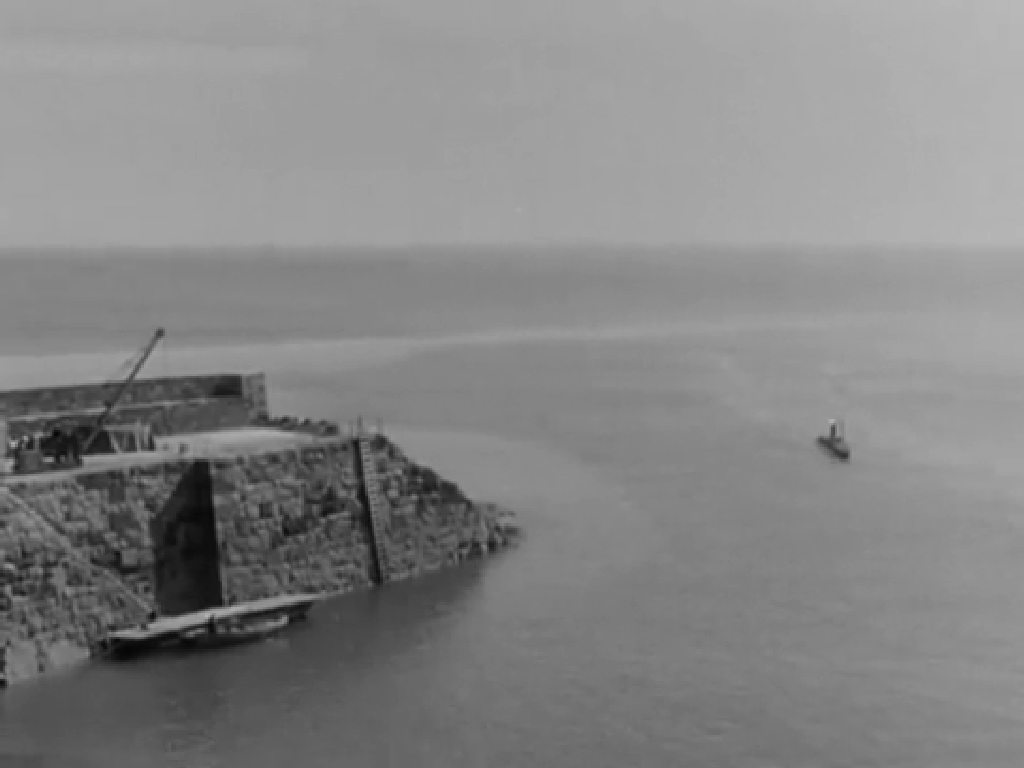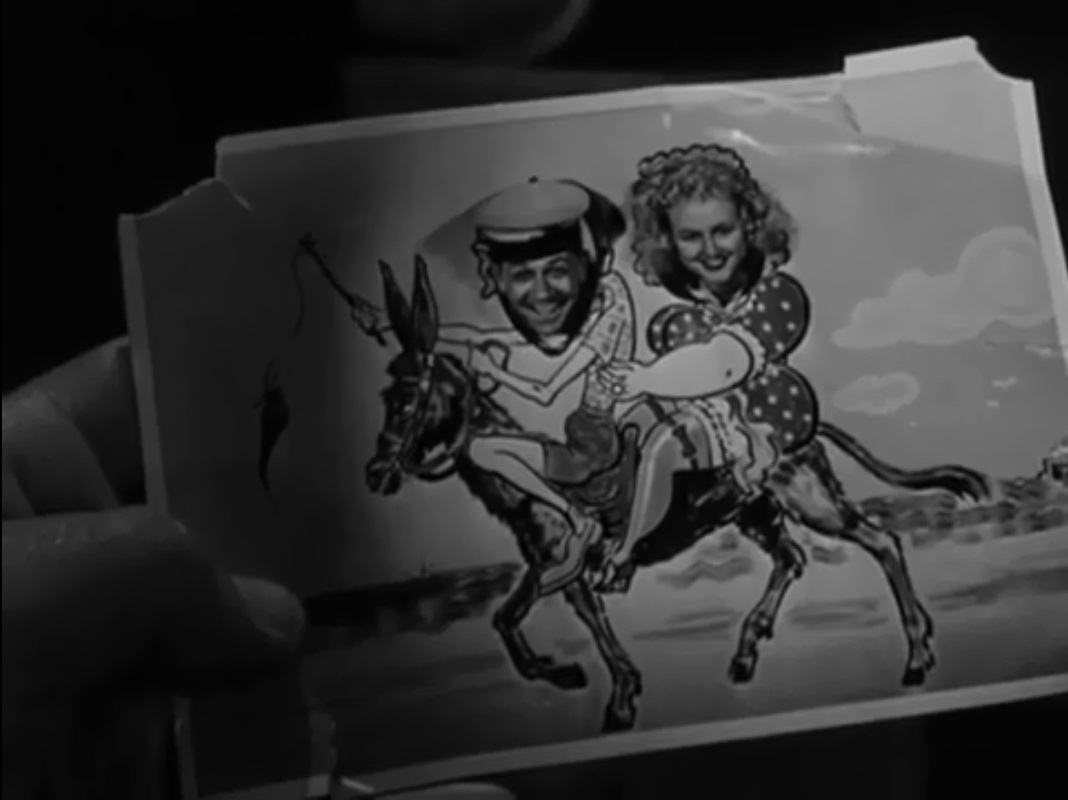Journey
Together
With Terence Rattigan and Gordon Jacob in the RAF. A film about the
education of raw talent, made to illustrate the importance of air navigation.
Boulting keys this to precision shots like landmarks amid a welter of difficult
gearing in complex articulated sequences like the bombing run. On the other end
of the stick is the image, a telling face or, to introduce the young Britons to
an American flying school, an unfamiliar landscape reflected in a train window.
The serenity of
Boulting’s diction is in the subtle appreciation of American and Canadian
distinctions, for example. Kubrick remembered this film in Paths of Glory,
Dr. Strangelove, and 2001: A Space Odyssey.
Brighton Rock
What is a seaside
resort, this one in particular, if not a lark that gets you through what might
be sordid surroundings?
Boulting’s
masterpiece gets right to it in the end after elegant lashings of silence and
violence.
And so you
“know the place for the first time,” it’s been there all
along throughout the film.
It isn’t
the rinky-dink gang preying on turf accountants and brushed aside by a plush
mobster nor any hue and cry, it’s a young villain who takes the plunge
and a little phrase on a phonograph record.
The Magic Box
The very essence
of genius, the very genius of the cinema, from a cranking street-organ to the
fire-eaters to the moving pictures, a continuous stream of inspiration, or
discontinuous per Bergman. “Turn that light out,” says Friese Greene interrupted in his laboratory, and seeing two
ladies, “turn it on again.”
The misery of Friese Greene, “they could have mentioned my
name.” Persistence of vision, by Jove.
The mystery of
photography as well, and anyone who will see a resemblance to Buster Keaton in
this phase of Robert Donat’s performance is
welcome.
Fox Talbot, Sir
Arthur Sullivan... Hyde Park on a Sunday, the invention of cinematography,
“with a life of its own.” The everlasting penury of the truly
devoted, in the midst of hardy businessmen, exhibitors, etc., at odds and
evens.
“Just the
price of a seat at the pictures.”
Crest
of the Wave

“What’s
this, another British heavyweight in training?” Seagulls over Sorrento in UK, but only in a laughing Caledonian
sort of way. “What’s a—what’s a Sassenach?”
“Sprog... a Sassenach is anyone from south of the border!”
“Oh, Mexican.” The new torpedo sinks its two-man test sub, boffin
and all, the Yanks have much the same idea and send
their backroom boy over at the Admiralty’s request.
Having
one’s prospects at the bottom of the sea is the very lamentable
proposition, the directors dwell on it in a memorable image. Is
it the warhead carrying an experimental payload, or the mechanism of the
torpedo, or perhaps the submarine firing apparatus? “How d’ye spell ‘memento’, Sprog?”
“No use askin’ me,
Lofty.”
“Didn’t
they teach you nothing at that orphanage? ‘Ere, m-i-m
‘mim’, e-n, t-o-e ‘toe’,
‘mimentoe’.”
“O’
course, ta, Badger.” The Nero and the Northern Star
are in the cryptic and allusive picture, “deflection angle” is the
critical factor, anyway there are the mirror themes of hot-tempered Allied
rivalry and a hectoring petty officer vis-Ó-vis
a veteran sailor with a flash point (cp. The
Hill, dir. Sidney Lumet), and throughout there is Doris, an offscreen
presence late of Southampton and New York (the structure is comparable to
Lean’s The Sound Barrier).
Cinematography
Gilbert Taylor, score Miklos Rozsa, directed with Roy Boulting most
impressively on location. Gene Kelly perhaps to invoke the dance motif of
Eliot’s Four Quartets.
A.W. of the New York Times, “largely a tempest in a
teapot,” and that went for the
play as well, to his way of thinking. Leonard Maltin,
“static account”. TV Guide,
“ran three years in London but only a few weeks on Broadway.” Halliwell’s
Film Guide, “long-running British service comedy... Americanized to
little effect... just about watchable.”

Private’s Progress
A history of
World War II from the vantage point of a varsity ninny called up in 1942.
“Come then,
let us to the task,” though no-one wants any part of it, despite a welcoming
address on Britain at war.
What does
transpire is a secret mission behind enemy lines to secure plundered works of
art, Operation Hatrack, the brainchild of Brigadier Tracepurcel in the War Office, M.I.3.
This floats a war
surplus business and nearly a South American honeymoon, but is undone by a fake
Holy Family shown up by the ninny.
The question is,
“how do you get the Africa Star?” In Which We Serve is a
great film to see absent without leave.
Variety liked the Army satire and thought the rest was
“an unreal melodramatic adventure,” not noting any congruity with
Crichton’s The Lavender Hill Mob. Other reviews are generally
unreflective, similarly.
Lucky Jim
The precise terms
in which the provincial hell of a junior lectureship in history can be
understood as a thing one leaves by train for London with the girl.
Nine months in
all are required for this understanding, and a jalopy belonging to the
department chair, to get to the station.
The exceptionally
acute satire depends upon a critical perception not readily available to film
critics, whose accomplishments bear out the assertion of Henry Ford at the
Memorial Lecture, “history is bunk.”
I’m All Right Jack
A complete,
highly detailed and unfailingly accurate analysis of the capitalist West, and that includes all the Communists.
Therefore it is
mandatory, or ought to be, in the schools, so that every student should come to
know the lay of the land, or the lie.
Every word of it
is true, taken from experience and drawn as it were to the life, not a trifle
is omitted, the whole kit ‘n caboodle is there, and the absconding
Chairman is Malcolm Muggeridge.
Heavens Above!
The Boultings’ supreme sendup
of a “clerical error”, the scouser prison
chaplain appointed vicar of Holy Trinity Church in Orbiston
Parva (in the same year as Losey’s The
Servant, he arrives and departs by dustcart), where the trinity is Tranquilax, stimulant and sedative and laxative in one, the
major concern.
He runs the
economy ragged, tears the town apart, supports a family of thieves who steal
the lead from the church roof, and finally is shot into space.
Bu˝uel’s Viridiana
has exactly the same idea.
Shares in Tranquilax Ltd. fall precipitously, the prime minister
recommends a name change, his party has had several.
Triple Crown Unction
is the new Tranquilax.
Directed with Roy
Boulting.
The Family Way
Schlesinger’s
A Kind of Loving,
expanded into the elephantine stasis of a nightmare, finally prying the young
wedded couple free on their honeymoon, with a house in view.
He is a projectionist
(Reisz’ Morgan—A Suitable Case for Treatment is on), so
there’s Clash by Night amid the comical interpolations, which
include Cat on a Hot Tin Roof.
A savory
nightmare satisfactorily realized and awakened from.
Bosley Crowther (New
York Times) thought it was deferentially therapeutic, Variety liked
the lad’s mum, Halliwell didn’t follow.
Directed with Roy
Boulting.